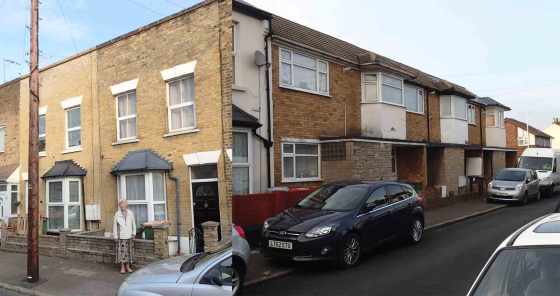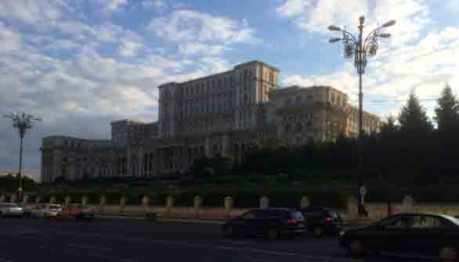I have made no secret of my strong belief that the UK would be foolish to leave the European Union (see “What has the EU ever done for us?“). Until now, I have argued the case for our environment being better protected by EU regulations and enforcement procedures. However, that is only part of the reason that I will be voting to stay in the EU on June 23. The emotional heart of my argument is encapsulated in the two photographs above.
They both show the road, Suffolk Street, in Forest Gate, East London, where my mother and her family lived during the Second World War. The left hand picture shows my mother standing outside the house where she was brought up. Like almost every house in the street it is a 19th century terraced house, with two rooms upstairs and three downstairs. Right up to the time my grandmother died in 1989 it had an outside toilet and no separate bathroom. The right hand picture shows three houses built in the 1960s that stand about 100 metres further along the road from my mother’s house. Those houses stand on the site where a German V1 flying bomb landed in 1944. My grandmother, mother and uncle emerged from the air-raid shelter at the end of their small garden to find their windows blown in and a gaping hole between two of the downstairs rooms. I still remember seeing the crack in the wall when I visited as a child. My mother’s favourite doll also lost one of its arms during the attack.
Seventy years on, I spend a proportion of my working life working with the European Union, and have a reasonable idea of the realities of getting representatives of 28 different countries to agree on a common path. It is not always easy, and sometimes there are frustrations and disagreements. The lack of uniformity across Europe is part of what makes travelling around the continent and working with people from other countries a generally rewarding experience. We share many values, but the expression of those values is shaped by different cultures and histories. Finding a way through the problems and disagreements is not always easy, but a brief pause to reflect on how far we have all travelled since Britain and Germany dropped bombs on one another is enough to put these disagreements into perspective.
There is much with which I do not agree within the European Union; the time is not right for greater movement towards a single federal state, and the Euro, for all the practical conveniences, was rushed ahead without thinking through all the implications. However, major constitutional changes require agreement from all members, so the UK cannot be forced down paths with which it disagrees profoundly. But all of these debates are fringe affairs compared to the recognition of shared values, achieved through the increased mobility of citizens around the EU, whether on holiday, to work or to study. Perhaps the UK does not get the full benefit of the free movement of labour because our language skills are not as developed as in many other countries? But that is a matter that we have to resolve ourselves and is hardly the fault of the EU. That said, the working language of scientists within the EU is English and I am writing this on the way back from a business trip to Romania, so there is hope, even for the linguistically challenged …
Being in Romania also served as a reminder of the role that the EU played in encouraging democracy and economic development in the former communist states. Liam Fox, the former Conservative Defence Secretary – and prominent “out” campaigner was scornful of the suggestion that the EU contributes to peace. That, he claimed, was due to NATO, not the EU. That betrays a very limited understanding of “peace” as no more than “not war”. “Peace” is a far bigger concept than Liam Fox’s definition, embracing all the interactions we have that make war inconceivable. NATO, at best, contributes to a sense of security in situations where true peace has already failed. But that’s a topic for another day.
A major limitation of the “out” campaigners is their appeal to a sense of nationalism that seems thoroughly behind the times in our modern interconnected world. To me, being “European” is just one more layer to my identity. It does not conflict with my nationality. I was reminded of this as I listened to Sunderland fans taunting Newcastle supporters as their victory over Everton consigned Newcastle to relegation. But I know that, as the European championships get under way, Sunderland and Newcastle fans will be standing side by side supporting England. So the idea of nested identities is hardly new. Europe is just one more layer to our identity. Voting to stay in on June 23rd is a complete no-brainer…
The Palace of the Parliament (“Casa Poporului”) in Central Bucharest, built on Nicolae Ceauşescu’s orders: a reminder of Romania’s Communist past.



I have been committed to Brexit for some time for various reasons. For me, “the time is not right for greater movement towards a single federal state'”, not just now but for ever. But this is the prevailing ideology or doctrine in Brussels, promulgated by unelected, unaccountable & thus undemocratic elites.
As De Gaulle said: ” oui a l’Europe des patries, non a l’Europe des états unitees”. ( I think my French is clear enough, if not entirely correct).
I regard Britain’s interests was being truly international or global, (where make our living) & as being part of the Anglosphere.
I do not regard myself as a “little Englander”, according to Cameron. I have visited for work & pleasure many European countries, and appreciate the contributions made to civilisation over the centuries by Europe, was distinct from the EU..
Bill
I’m sure you and I could sit down and have a long conversation about whether or not it is better to argue from the inside or to get out now. I probably have more opportunities than most to see the EU at its most frustrating. But I do worry that the “out” campaign is making a blatant appeal to a “Little Englander” mentality, especially over migration. In my calmer moments, however, I rationalise that a free trade agreement will probably entail UK staying signed up to a “level playing field” in order to have access to the single market, so we’ll end up with most of the environmental obligations intact. We’ll have to wait and see …